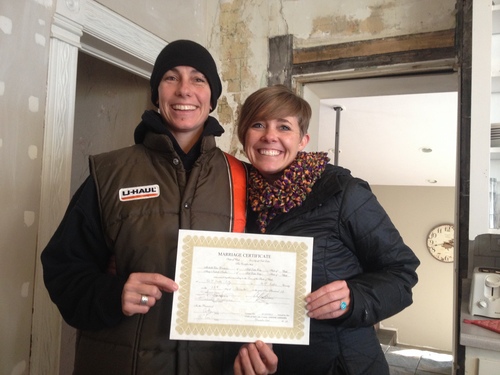This is an archived article that was published on sltrib.com in 2014, and information in the article may be outdated. It is provided only for personal research purposes and may not be reprinted.
A class-action lawsuit was closed Thursday, hours after a Salt Lake City attorney insisted he had the right to use the names of a married lesbian couple without their permission in the complaint.
E. Craig Smay named Amy N. Fowler and Pidge Winburn as plaintiffs in the complaint he filed Dec. 27 in U.S. District Court that listed the state and The Church of Jesus Christ of Latter-day Saints as defendants.
Fowler and Winburn were married Dec. 23, and the newlyweds were featured in a front-page story in The Salt Lake Tribune days later. Smay said Thursday that is where he got their names.
Neither Fowler nor Winburn has ever spoken with Smay, and neither was aware he had listed them as plaintiffs in the lawsuit until a Tribune reporter informed them. Fowler, an attorney, immediately attempted to contact Smay by telephone and email to get their names removed from the lawsuit, which they have no interest in supporting.
Fowler was unable to reach Smay, and, on Dec. 31, the couple filed a motion asking the court to dismiss the lawsuit. On Thursday, Fowler also filed a complaint about Smay's action with the Utah State Bar.
Smay told the Tribune on Thursday that under federal court rules, he did not need permission to list the pair as plaintiffs in a class-action lawsuit. He also said he informed Fowler by email that he didn't need her consent and claimed she "blabbed" to the press about the lawsuit.
"I've explained it carefully," he said. "She can file until the cows come home. She's wasting her time and she's wasting my time."
But Fowler said she had not received any email from Smay and would be "incredibly" surprised if he could legally use their names without permission.
Apparently, she was right.
Fowler said a court clerk told her late Thursday afternoon the case had been closed. A summary of the case's status available online listed its disposition as "dismissed" and "closed."
Three attorneys — one a former federal judge — say Smay was out of line in filing the complaint in the first place.
"To name someone as a plaintiff without their permission is not what the rules of procedure allow," said Paul Cassell, a University of Utah law professor and former federal judge. "You can file a class action, but the way that is done is you have named plaintiffs whom you represent and have permission to represent. You can't drag someone into a lawsuit without their permission claiming to represent them."
Smay said he filed the class-action lawsuit because of the state's ongoing efforts to stop gay marriages and eventually have them invalidated.
"I filed it because I think that what the state, backed by the church, is doing is wrong, which the Supreme Court has made clear to them," said Smay, who said he is not LDS or gay. "How would you feel if it were your marriage? You would feel very badly about that. That's infliction of emotional distress that ought not to be happening."
Smay said he believes U.S. District Court Judge Robert J. Shelby got it right in his Dec. 20 decision that found Utah's ban on same-sex marriage was unconstitutional. He filed an amicus brief on Dec. 26 in support of Shelby's refusal to grant the state's request for a stay of his ruling.
"The demand for a stay in this case is simply a cruel imposition upon gay people," Smay wrote. "It should be promptly denied."
In addition to Shelby, the 10th U.S. Circuit Court of Appeals refused three requests from the state for a stay. The state is now asking the U.S. Supreme Court to put the ruling on hold.
Early Thursday, Smay said he would remove Fowler's and Winburn's names only when "we have someone else to substitute in."
"In the meantime, there is no requirement that we take her name off," he said.
But like Cassell, attorney Paul Burke said Smay is wrong.
"A lawyer should not act on behalf of a person without having been engaged by that person or authorized by a court" to represent him or her, said Burke, who is general counsel at Ray Quinney & Nebeker and handles professional ethics for the law firm. "He can't just assume consent. He needs actual consent and authority to act on their behalf."
Cliff Rosky, a University of Utah law professor and an Equality Utah board member, said Smay was "flagrantly in violation of ethical rules."
"Suing the LDS Church is misguided," Rosky said, "because the church is protected by the First Amendment of the U.S. Constitution and because the church has nothing to do with the lawsuit."
Beyond that, "Everyone in this country has the right to go to court and present their views and have them heard by a judge. The state of Utah has that right as much as the same-sex plaintiffs do. You don't sue someone for appealing."
Clients control the objectives of a lawsuit, Rosky said, and Smay is admittedly at odds with Fowler and Winburn. Smay also misled the court by holding himself out as their attorney.
"If your client tells you, 'I don't want you to be my lawyer anymore,' " Rosky said, "then you have to" respect that.
Twitter: @Brooke4Trib





